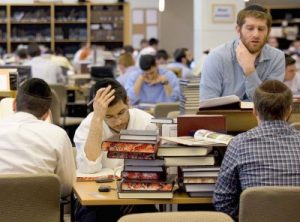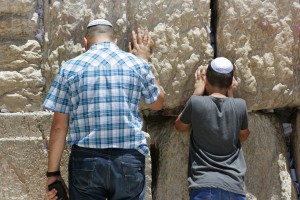 In this week’s reading, we are told that “Yisro heard all that G-d had done for Moshe and Israel his nation, for HaShem had taken Israel from Egypt” [18:1].
In this week’s reading, we are told that “Yisro heard all that G-d had done for Moshe and Israel his nation, for HaShem had taken Israel from Egypt” [18:1].
Rashi (Rabbi Shlomo Yitzchaki) asks: what did Yisro hear? He answers, “the parting of the Reed Sea, and the war with Amalek.”
These two events were, to say the least, public knowledge. The Medrash says that at the moment that the sea parted for the Jews, every body of water, even every glass of water, also parted. This happened so that everyone would know about the miracle done for the Jews at that moment. So, yes, Yisro heard, and saw. He was sitting in his living room about to have his tea, and it split before his eyes. But this also happened for every other Midyanite, and every other person. So why does the Torah say that Yisro heard? Everyone heard!
We learn from Yisro the essence of “hearing.” A “shomea,” one who hears, does not merely have a functioning inner ear. Yisro, the “Kohen Midyan”, the priest of the Midyanites, dropped everything to go join the Nation of Israel. Why? Because he alone really heard the message. G-d sent the message to every person on earth — but Yisro heard.
While computers are doing a better and better job of automating this task, it is still important that we save our work frequently. Anyone with computer experience has experienced the unique frustration of spending an hour or more at the keyboard working on an important task, and then having the computer freeze up or power off without the opportunity to save one’s work. Whatever we do not commit to the computer’s memory, we lose.
We ourselves are not all that different. We often claim to “hear” something that goes “in one ear and out the other.” G-d sends us messages. He enters the data. But it is our responsibility to process and save that data. When something happens, when we receive a message, we can only say we have truly “heard” if we remember, understand, and learn from the experience. In the Torah, “hearing” means “Sh’ma Yisroel” [Hear, Israel, the L-rd our G-d, the L-rd is One], and “Naaseh V’Nishma” [We will do, and we will hear…].
Did we get the message?
[Based upon a class by Rav Asher Z. Rubenstein zt”l of Jerusalem.]

 The Biblical Book of Exodus begins with the tale of Pharoah and the Jews under Egyptian rule. Most people are at least vaguely familiar with the story, but few notice that it is the first account of organized, institutional anti-Semitism against the Jews.
The Biblical Book of Exodus begins with the tale of Pharoah and the Jews under Egyptian rule. Most people are at least vaguely familiar with the story, but few notice that it is the first account of organized, institutional anti-Semitism against the Jews. In this week’s reading, Yaakov parcels out blessings to his sons, based upon his prophetic understanding of their futures. He describes Yissachar as a strong-boned donkey, who saw that “rest” was good, yet “bent his shoulder to bear, and became a servant to tasks” [49:14-15].
In this week’s reading, Yaakov parcels out blessings to his sons, based upon his prophetic understanding of their futures. He describes Yissachar as a strong-boned donkey, who saw that “rest” was good, yet “bent his shoulder to bear, and became a servant to tasks” [49:14-15]. In this week’s reading, Joseph reveals himself to his brothers as second-in-command over all of Egypt. Due to the famine, he encourages the entire family to join him, but does so with unusual language: “Hurry and go up to my father, and say to him, ‘so says your son, Yosef: G-d has placed me as Master over all of Egypt; come down to me, do not stand still'” [45:9]. Go up to my father, he says, and tell him to come down to me.
In this week’s reading, Joseph reveals himself to his brothers as second-in-command over all of Egypt. Due to the famine, he encourages the entire family to join him, but does so with unusual language: “Hurry and go up to my father, and say to him, ‘so says your son, Yosef: G-d has placed me as Master over all of Egypt; come down to me, do not stand still'” [45:9]. Go up to my father, he says, and tell him to come down to me.



 In this week’s reading, the verse says “Lo Sisgodedu” — “do not cut yourselves,” which was a mourning practice of idolators. But the Medrash tells us that the words give us another messages as well: “do not divide, do not split up.”
In this week’s reading, the verse says “Lo Sisgodedu” — “do not cut yourselves,” which was a mourning practice of idolators. But the Medrash tells us that the words give us another messages as well: “do not divide, do not split up.”